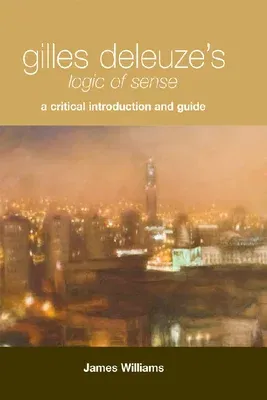James Williams
(Author)Gilles Deleuze's "Logic of Sense": A Critical Introduction and GuidePaperback, 20 May 2008

Qty
1
Turbo
Ships in 2 - 3 days
Only 2 left
Free Delivery
Cash on Delivery
15 Days
Free Returns
Secure Checkout

Part of Series
Critical Introductions and Guides
Print Length
232 pages
Language
English
Publisher
Edinburgh University Press
Date Published
20 May 2008
ISBN-10
0748626115
ISBN-13
9780748626113
Description
Product Details
Author:
Book Format:
Paperback
Country of Origin:
GB
Date Published:
20 May 2008
Dimensions:
23.39 x
15.75 x
1.4 cm
ISBN-10:
0748626115
ISBN-13:
9780748626113
Language:
English
Location:
New York
Pages:
232
Publisher:
Weight:
399.16 gm